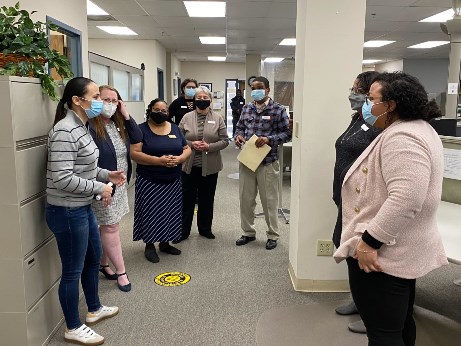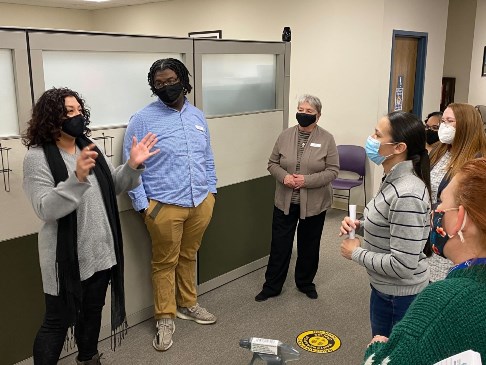The Kansas City, Kansas, Board of Education voted to drop contact tracing of COVID—19 cases at the Tuesday night school board meeting.
Superintendent Anna Stubblefield told the board the district had received information from the Kansas Department of Health and Environment that it and the Health Department were no longer doing contact tracing here.
Dr. Stubblefield said the district’s health staff did not have a recommendation, and did not initiate this, but they wanted the board’s direction on what to do.
In addition, there was a health department recommendation for the schools not to contact trace starting Feb. 1, for 30 days, she said.
Board member Maxine Drew said she felt that if the Health Department decided not to do contact tracing, the school district needs to comply with them. It would be important to stress to students to wear masks when they come into the buildings, she added.
On a 5-1 vote, with board member Wanda Brownlee Paige voting no, the board voted to “follow the recommendation of the Health Department along with KDHE” in regards to contact tracing.
The school board attorney, Greg Goheen, said the district has done a good job of following KDHE and CDC guidance during the pandemic. If the Health Department is not doing contact tracing, he said, then the school district would have a lesser right to do it on its own than the Health Department, since the Health Department has statutory legal authority on it and the district doesn’t. The district has been designated to do contact tracing in the past by the Health Department, extending its authority to the district’s health staff.
Goheen said there is a privacy element involved in contact tracing, in which specific health information about other individuals with whom they have been in close contact is released. The Health Department has the right to disclose that information, but the school district has a lesser right to do that on its own, because of medical privacy laws, he said.
Goheen said all that doesn’t mean the school district can’t enforce its mask mandate or other safety precautions on school premises.
Dr. Stubblefield said the school district can still notify parents that their children may have been exposed to a positive COVID-19 case in their classroom or pod. They just won’t name or identify the individual who had tested positive.
Paige said she’s scared because the COVID-19 numbers were so high. She said there were examples of people coming to school sick and not telling anyone about it.
“I just think we put too many people in jeopardy,” she said.
Dr. Stubblefield said people who test positive and work next to two other people will in the future be required to quarantine, and would be asked to tell those people they were next to that they were positive. Staff would not ask them who their contacts were in the future.
The superintendent said they would continue to update the district’s COVID dashboard with the number of cases.
Board President Randy Lopez said it has been difficult for the district’s health services team to keep up with contact tracing at times, since there are about 4,000 staff members and 20,000 students.
In answer to board Vice President Yolanda Clark’s question whether they needed to require individuals to notify those around them about their positive status, Superintendent Stubblefield said that while that would make sense, it would be difficult to enforce and manage.
The school district has its own contact tracers hired through a KDHE grant, and those employees will continue to go through emails, follow up with people who are symptomatic, tell them they are required to quarantine and can come back after five days, and give out information on where they can submit proof of negative test, according to the superintendent. They just will not do the contact tracing part.
On another health issue, the school board unanimously approved a change to its weekly testing program for unvaccinated staff.
Dr. Stubblefield said people can have a false positive test result because they had been positive long ago. If the unvaccinated staff member shows proof of a positive test in the last 90 days, and doesn’t have symptoms, he or she would not have to test, and would then resume testing once the 90 days has expired. That is current CDC guidance, according to district officials.
They’re battling three variants now, and if they don’t have to do unnecessary surveillance testing, it would save tests for where they really need them, said Tiffany Lewis, the district’s director of health services.



